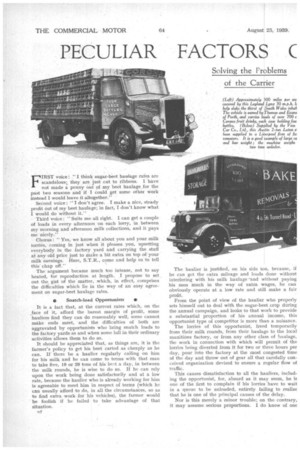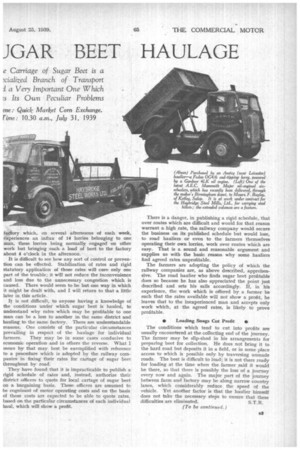PECULIAR FACTORS JGAR BEET HAULAGE
Page 36

Page 37

If you've noticed an error in this article please click here to report it so we can fix it.
Solving the Problems of the Carrier
FIRST voice : " I think sugar-beet haulage rates are scandalous,. they are just cut to ribbons. I have not made a penny out of my beet haulage for the past two seasons and if I. could get some other work instead I would leave it altogether."
Second voice : " I don't agree. I make a nice, steady profit out of my beet haulage; in fact, I don't know what I would do without it."
Third voice: "Suits me all right. I can get a couple of loads in every afternoon on each lorry, in• between my morning and afternoon milk collections, and it pays me nicely."
Chorus : "Yes, we know all about you and your-milk Lorries, corning in just when it pleases you, upsetting everybody in the factory yard and carrying the stuff at any old price just to make a bit extra on top of your milk earnings. Here, S.T.R., come and help us to tell this' chap off."
The argument became much too intense, not to say heated, for reproduction at length. I propose to set , out the gist of the matter, which, in effect, comprises the difficulties which lie in the way of an easy agreement on sugar-beet haulage rates.
0 Snatch-load Opportunists .
It is a fact that, at the current rates which, on the
face of it, afford the barest margin of profit, some _ hauliers find they can do reasonably well, some cannot make ends meet, and the difficulties of both are aggravated by opportunists who bring snatch loads to the factory yards as and when some lull in their ordinary activities allows them to do so.
It should be appreciated that, as things are, it is the farmer's policy to get his beet carted as cheaply as he can. If there be a haulier regularly calling on .him for his milk and he can come to terms with that man to take five, 10 or 20 tons of his het a day, in between the milk rounds, he is wise to do so. If he can rely upon the work being done satisfactorily and at a low rate, because the haulier who is already working for him is agreeable to meet him in respect of terms (which he can usually afford to do, in all the circumstances, so as to find extra work for his vehicles), the farmer would be foolish if he failed to take advantage of that situation.
132
The haulier is justified, on his side too, because, if he can get the extra mileage and loads done without interfering with his milk haulage -and without paying his men much in the way of extra wages, he can obviously operate at a low rate and still make a fair profit.
From the point of view of the haulier who properly sets himself out to deal with the sugar-beet crop during the annual campaign, and looks to that work to provide a substantial proportion of his annual income, this opportunist type of competitor is more than a nuisance.
The lorries of this opportunist, freed temporarily from their milk rounds, from their haulage to the local munitions factory, or from any other class of haulage, the work in connection with which will permit of the lorries being diverted from it for two or three hours per day, pour into the factory at the most congested time of the day and throw out of gear all that carefully conceived organization devised to ensure a regular flow of traffic.
This causes dissatisfaction to all the hauliers, including the opportunist, for, absurd as it may seem, he is one of the first to complain if his lorries have to wait in a queue to be unloaded, entirely failing to realize that he is one of the principal causes of the delay.
Nor is this merely a minor trouble; on the contrary, it may assume serious proportions. I do know of one factory which, on several afternoons of each week, experiences an influx of 14 lorries belonging to one man, these lorries being normally engaged on other work but bringing each a load of beet to the factory about 4 o'clock in the afternoon.
It is difficult to see how any sort of control or prevention can be effected. Stabilization of rates and rigid statutory application of those rates will cure only one part of the trouble; it will not reduce the inconvenience and loss due to the unnecessary congestion which is caused. There would seem to be but one way in which it might be dealt with, and I will return to that a little later in this article.
It is not difficult, to anyone having a knowledge of the conditions under which sugar beet is hauled, to understand why rates which may be profitable to one man can be a loss to another in the same district and hauling to the same factory. There are understandable reasons. One consists of the particular circumstances prevailing in respect of the haulage for individual farmers. They may be in• some cases conducive to economic operation and in others the reverse. What I mean by that may best be exemplified with reference to a procedure which is adopted by the railway companies in fixing their rates for cartage of sugar beet throughout by road.
They have found that it is impracticable to publish a rigid schedule of rates and, instead, authorize their district officers to quote for local cartage of sugar beet on a bargaining basis. These officers are assumed to be cognizant of motor operating costs and on the basis of those costs are expected to be able to quote rates, based on the particular circumstances of each individual haul, which will show a profit. There is a danger, in publishing a rigid schedule, that over routes which are difficult and would for that reason warrant a high rate, the railway company would secure the business on its published schedule but would lose, to road hauliers or even to the farmers themselves operating their own lorries, work over routes which are easy. That is a sound and reasonable argument and supplies us with the basic reason why some hauliers find agreed rates unprofitable.
The farmers are adopting the policy of which the railway companies are, as above described, apprehensive. The road haulier who finds sugar beet profitable does so because he has also appreciated the point just described and sets his sails accordingly. If, in his experience, the work which is offered by a farmer be such that the rates available will not show a profit, he leaves that to the inexperienced man and accepts only work which, at the agreed rates, is likely to prove profitable.
• Loading Snags Cut Profit • The conditions which tend to cut into profits are usually encountered at the collecting end of the journey. The farmer may be slip-shod in his arrangements for preparing beet for collection. He does not bring it to the hard road but deposits it in a field, or in some place access to which is possible only by traversing unmade roads. The beet is difficult to load; it is not there ready for loading at the time when the farmer said it would be there, so that there is possibly the loss of a journey every now and again. The major part of the journey between farm and factory may be along narrow country lanes, which considerably reduce the speed of the vehicle. Yet another factor is that the haulier himself does not take the necessary steps to ensure that these
difficulties are eliminated. S.T.R.












































































